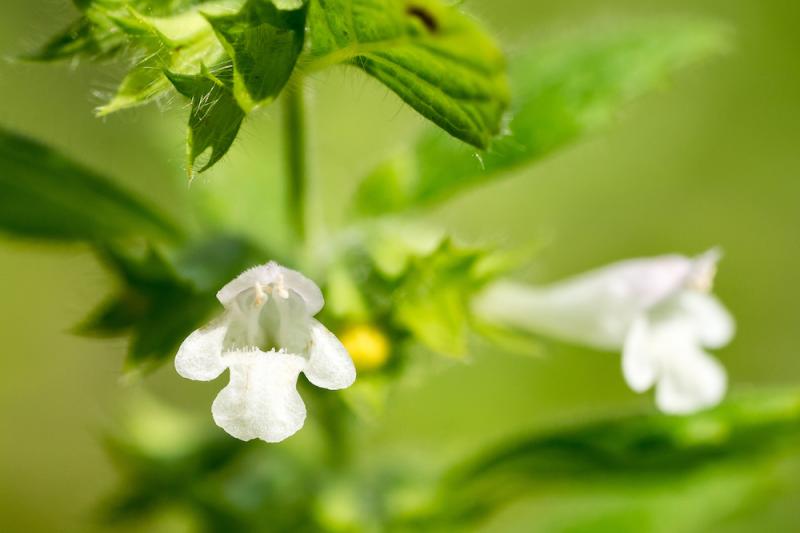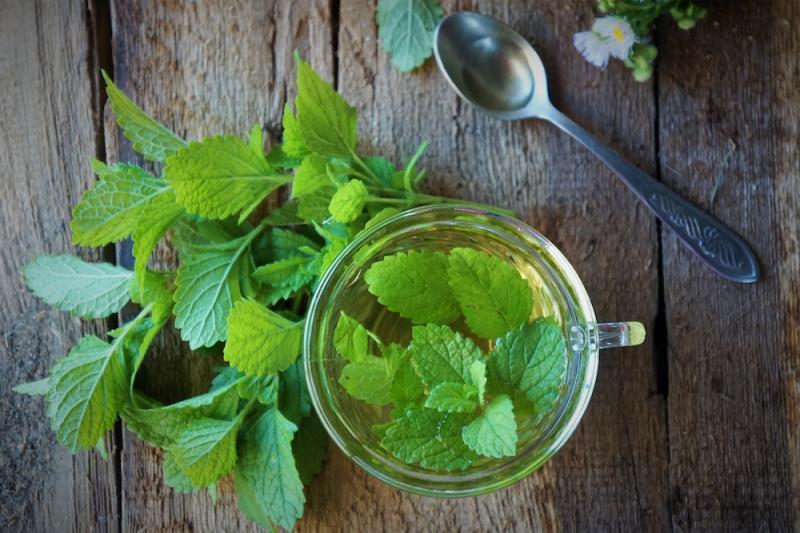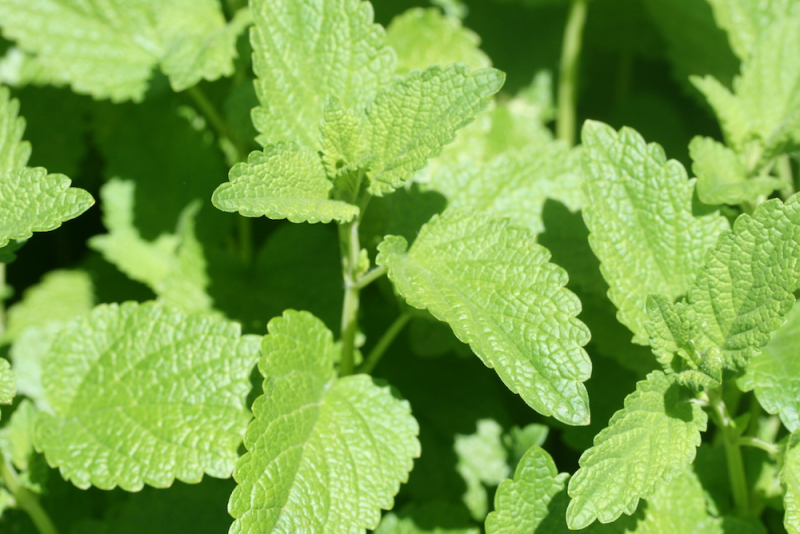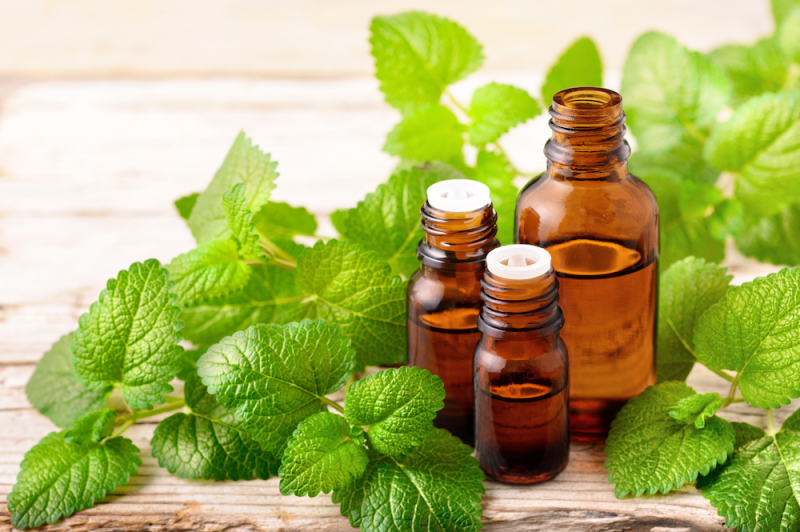 I love growing lemon balm (Melissa officinalis) in the garden. I enjoy running my hand over the leaves and then smelling the lemony fragrance that lingers on my fingers. It reminds me of lemon furniture polish and provides a distinctly uplifting feeling when I smell it. Like borage, which I wrote about last week, it’s an annual that is easy to grow in the garden and readily reseeds itself. It also attracts bees; the Latin name Melissa being derived from the Greek word for bee.
I love growing lemon balm (Melissa officinalis) in the garden. I enjoy running my hand over the leaves and then smelling the lemony fragrance that lingers on my fingers. It reminds me of lemon furniture polish and provides a distinctly uplifting feeling when I smell it. Like borage, which I wrote about last week, it’s an annual that is easy to grow in the garden and readily reseeds itself. It also attracts bees; the Latin name Melissa being derived from the Greek word for bee.
Uplifting Fragrance for Sadness and Depression
Lemon balm and its essential oil are remedies that can help to lift a person’s mood when they’re discouraged or depressed. It’s particularly helpful when that down feeling is caused by grief and sadness.
Many herbalists have noted this uplifting property in lemon balm. In 1679, John Evelyn wrote: "Balm is sovereign for the brain, strengthening the memory and powerfully chasing away melancholy." The herbalist Gerard said that it "comforteth the heart and driveth away all sadness." Judy Josiah, an herbalist who wrote for Nature's Field, said, "Lemon balm is a gladdening herb, bringing comfort and restoring joy and faith in life."
 I experienced this comforting effect in a very personal way while at a board meeting for the American Herbalist Guild. It was only a week after my last-born child died of SIDS and one of the board members asked me how my two-month-old baby was doing. When I shared the news about his death, Amanda McQuade Crawford stood up and said, “I’ll make you some lemon balm tea.”
I experienced this comforting effect in a very personal way while at a board meeting for the American Herbalist Guild. It was only a week after my last-born child died of SIDS and one of the board members asked me how my two-month-old baby was doing. When I shared the news about his death, Amanda McQuade Crawford stood up and said, “I’ll make you some lemon balm tea.”
Amanda immediately went out and picked some fresh lemon balm from the herb garden and made the tea for me. I remember feeling better as I drank it. And while some of that was from the appreciation I felt for Amanda’s care and concern, I believe the tea helped too. It’s hard to tell sometimes how much of the effect of something is the result of the remedy and how much of it is the attitude of the person administering it.
Hyperthyroid Remedy
 There’s a kind of paradoxical effect to lemon balm, however. While I find the aroma uplifting, the herb is calming at the same time. It helps ease anxiety and symptoms of nervousness. It is particularly helpful for a hyperthyroid condition, where the thyroid is overactive causing the metabolism to race. Mixed with bugleweed and motherwort, it helps to sedate the thyroid. It also helps to ease the rapid heartbeat, palpitations, and other symptoms of an overstimulated sympathetic nervous system. It can help ease sweaty palms associated with nervousness and aid sleep.
There’s a kind of paradoxical effect to lemon balm, however. While I find the aroma uplifting, the herb is calming at the same time. It helps ease anxiety and symptoms of nervousness. It is particularly helpful for a hyperthyroid condition, where the thyroid is overactive causing the metabolism to race. Mixed with bugleweed and motherwort, it helps to sedate the thyroid. It also helps to ease the rapid heartbeat, palpitations, and other symptoms of an overstimulated sympathetic nervous system. It can help ease sweaty palms associated with nervousness and aid sleep.
The effect of lemon balm on the nervous system also has a beneficial effect on the digestive system. Too much sympathetic nervous activity shuts down digestion and intestinal motility. Lemon balm can ease nervous indigestion, especially when taken as a hot tea after a meal. It can also ease nausea, vomiting, dyspepsia, and intestinal gas.
Antiviral Remedy
I’d also classify lemon balm, and especially lemon balm essential oil, as a dependable antiviral agent. It’s indicated in the acute stage of viral infections where the tongue is red and elongated. As a hot tea, it will promote perspiration and help to bring down fever, especially in children. Its antiviral properties make it useful for more chronic viral infections like herpes, cold sores, chickenpox, and shingles. Research suggests it works by inhibiting the spread of viruses. You can apply the essential oil topically to cold sores and other skin infections, but I’d mix it with a little olive oil when applying it.
as a dependable antiviral agent. It’s indicated in the acute stage of viral infections where the tongue is red and elongated. As a hot tea, it will promote perspiration and help to bring down fever, especially in children. Its antiviral properties make it useful for more chronic viral infections like herpes, cold sores, chickenpox, and shingles. Research suggests it works by inhibiting the spread of viruses. You can apply the essential oil topically to cold sores and other skin infections, but I’d mix it with a little olive oil when applying it.
If you have a spot for an herb garden where you live, lemon balm is definitely one of the plants you should have in it. I hope you’ll enjoy its lemony fragrance and uplifting, but calming action as much as I have.
Steven's Articles
-

-
Eucommia Bark
A superior tonic that promotes kidney, structural,…
January
-

-
Goldenthread, Phellodendron, and Yellow Root
Three herbal remedies containing the infection-fighting…
-

-
Teasel
A traditional herb for healing bones and joints…
-

-
Barberry and Healthy Personal Boundaries
A thorny shrub for fighting infections and supporting…
December
-

-
The Evidence for Berberine
A yellow alkaloid found in traditional infection-fighting…
-

-
The Sensible Use of Caffeinated Herbs
Kola nuts, guarana, and yerba mate and other herbs…
-

-
The Health Benefits and Problems with Coffee
This popular caffeinated beverage can be beneficial…
October
-

-
Understanding Caffeine & Cellular Adaptation
Preserving the power of caffeine's buzz and the…
September
-

-
Horseradish
A pungent spice for aiding protein metabolism…
-

-
Banaba or Crepe Myrtle
A beautiful tree from Southeast Asia whose leaves…
August
-

-
Monkeyflowers
Flower essences to help see ourselves more clearly…
-

-
Mariposa Lilies
Strengthening the bond between mother and child…
-

-
The Noble Bay Leaf
A common kitchen herb for aiding digestion and…
-

-
Epimedium: Horny Goat Weed
A circulatory stimulant and kidney yang tonic…
July
-

-
The Medicinal and Nutritional Benefits of Apricots
A nutritious fruit and valuable medicinal seed for coughs

